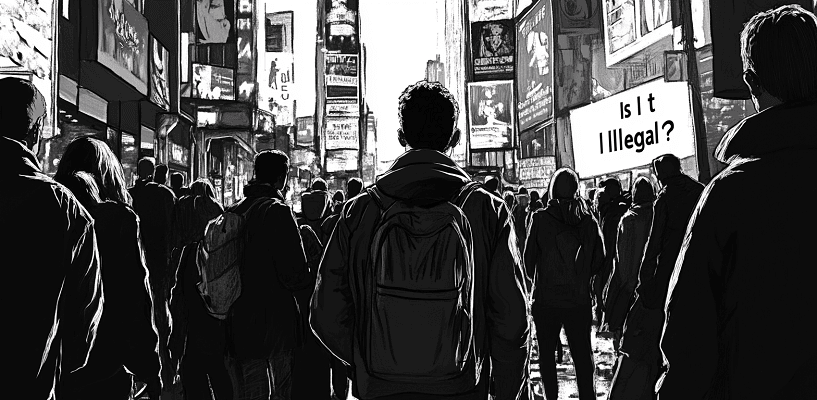- ॐ, Home
- >>
- US
- >>
- Politics
- >>
- Government
- >>
- Is It Illegal
Is It Illegal

From everyday habits to viral social media trends, ‘legal’ gray areas can leave people confused about what’s lawful and what isn’t. You’re about to do something mundane — jump a turnstile, download a movie, or even pick a flower from a public park — when a nagging question pops into your head: “Wait…is it illegal?” The line between ‘lawful and unlawful’ isn’t always clear, and in a world where laws vary by ‘country, state, and even city,’ confusion is inevitable. We’ve all suffered this.
Common “Is It Illegal?” Scenarios -
| Scenario | |
|---|---|
| Collecting Rainwater | Surprisingly, some U.S. states (e.g., Colorado) once banned it to protect water rights. Many now allow limited collection, but rules vary. |
| Driving Barefoot | Contrary to popular belief, ‘driving barefoot’ is not illegal in most places. However, if driving without shoes contributes to an accident, a driver could be cited for reckless driving or negligence. |
| Fishing Without a License | Most states require licenses for adults, with exceptions for private ponds or “free fishing days” (e.g., in Florida). Fines up to $500 for violations. |
| Flying Drone Over Private Property | In the U.S., the FAA regulates airspace, so flying a drone over someone’s property is generally legal as long as you stay below 400 feet and avoid restricted zones (e.g., near airports). However, state privacy laws may apply if you ‘record or surveil’ someone without consent. |
| Jaywalking | Jaywalking is technically illegal in most places. However, enforcement varies widely. Some cities issue fines for crossing outside of designated crosswalks, while others may overlook it unless it causes a traffic hazard. Some cities, like “Los Angeles,” decriminalized it in 2022. |
| Leaving Kids in a Car | Leaving children unattended in a car can be illegal, depending on the state. Over 20 states have laws prohibiting it, often specifying ‘an age limit and time duration.’ |
| Lying On Resume | Lying about a ‘license, certification, or degree’ required for a job (e.g., medical licenses, engineering certifications, law degrees) can constitute fraud or criminal impersonation. Penalties include fines or imprisonment. |
| Reselling Concert/Sports Tickets for Higher Prices | Varies in legality depending on the state and platform. New York: Reselling tickets for more than a 45% markup is illegal. Tennessee: Requires resellers to obtain a special license to resell tickets. Platforms like ‘Ticketmaster’ may also have their own resale rules. |
| Recording Conversations | In the U.S., it depends on the state. “One-party consent” states (like Texas) allow recording if one person (you) agrees. “All-party consent” states (like California) require everyone’s permission. |
| Sharing Passwords for Streaming Services | While it may not seem like a big deal, sharing your ‘Netflix or Disney+’ password could be considered a violation of the platform’s terms of service. Some jurisdictions, like ‘Tennessee,’ have laws that make unauthorized sharing of subscription-based entertainment accounts a punishable offense. |
| Tipping at Restaurants | Tipping is not legally required in most cases, but it is a strong social norm. Servers in the U.S. often earn below ‘minimum wage’ (as low as $2.13/hour federally) and rely on tips to make up the difference. However, restaurants are legally required to ensure servers meet the federal minimum wage if tips fall short. Mandatory gratuity for large groups (e.g., 6+ people) is enforceable, and refusing to pay it could result in legal action or being banned from the establishment. |
| Torrenting Movies/Music | Downloading copyrighted material without permission is illegal in most countries. Enforcement varies, though — some users get “fines,” others just warnings. |
| Using a Fake Name Online | Generally legal unless used for fraud. California penalizes impersonation to harm others, while the EU allows ‘pseudonyms under GDPR’ if not deceptive. |
| Using Someone Else’s Wi-Fi Without Permission | Using a neighbor’s Wi-Fi without their consent can be considered “unauthorized access” to a network. Illegal under hacking laws (e.g., U.S. Computer Fraud and Abuse Act), even if the network is unprotected. |
Consequences Aren’t Always Obvious -
Just because something is illegal doesn’t always mean you’ll face severe consequences. The legal system considers factors like:
- Intent → Was it an accident, or was it deliberate? (e.g., accidentally taking the wrong bag vs. stealing it on purpose).
- Enforcement → Law enforcement often prioritizes serious crimes over minor infractions. (e.g., jaywalking vs. robbery).
- Civil vs. Criminal → Some actions break rules but aren’t crimes. (e.g., not paying rent might lead to eviction, but it’s not a criminal offence).
- Severity → Some laws carry minor penalties (like a small fine), while others result in jail time. (e.g., littering might get you a warning or a fine, but arson could lead to serious prison time).
- Discretion in Enforcement → “Officers, prosecutors, and judges” have discretion in how they enforce laws (e.g., a police officer may let you off with a warning for speeding instead of issuing a ticket).
- Public Perception → When laws become ‘outdated’ or no longer align with public values, they often fall into disuse, even if they remain technically illegal (e.g., in some places, possession of small amounts of certain drugs has been ‘decriminalized’ or is rarely prosecuted due to shifting public attitudes toward drug use and addiction).
Laws exist to set boundaries, but how they’re applied depends on the situation. “Is it illegal?” is a question with layers. While some acts are universally condemned (theft, violence), many occupy gray areas shaped by ‘culture, location, and circumstance.’
Staying informed — not paranoid — is the best way to navigate life’s legal ambiguities. Next time you hesitate, remember: ‘a quick search’ or ‘a call to a legal expert’ can turn a risky guess into a confident decision.
Why Do We Ask “Is It Illegal?” -
We ask “Is it illegal?” because we want clarity on whether ‘an action, behavior, or situation’ violates the law and could result in consequences. This question arises for several reasons:
- Avoiding Legal Trouble – People want to make sure they are not breaking laws that could lead to ‘fines, lawsuits, or even jail time.’
- Ethical and Moral Considerations – Sometimes, legality is tied to morality. People might ask this to understand if something is ‘socially or ethically’ acceptable.
- Unclear or Confusing Laws – Laws can ‘be complex, vary by location, and change over time,’ making it necessary to confirm what is legal and what isn’t.
- Business and Professional Concerns – Companies and individuals want to operate within legal boundaries to avoid ‘penalties, lawsuits, or damage to their reputation.’
- Internet and Social Media Discussions – With widespread misinformation, people often seek clarification on whether something is ‘truly illegal’ or just a common misconception.
- Personal Safety and Rights – People want to know their “rights and protections,” whether it’s about self-defense, free speech, or other legal matters.
- Traveling Abroad – Ensuring compliance with local laws (e.g., visa rules, medication restrictions) to ‘avoid delays, fines, or even detention.’
Asking “Is it illegal?” in these contexts isn’t just about legality — it’s about avoiding “inconvenience, financial loss, or unexpected consequences.”
How to Find Reliable Answers -
Finding reliable answers to the question “Is it illegal?” requires careful research from trusted sources. As:
- Check Official Sources – Government websites (e.g., with ‘.gov’ extension) or local ordinances.
- Consult Legal Codes and Statutes – Search for the relevant law in “Federal and State Legal Databases” (e.g., Cornell Law School’s Legal Information Institute) and/or “Local Municipal Codes” (often found on city or county websites).
- Use Reliable Legal Resources – Platforms like ‘FindLaw, Justia or Nolo’ explain laws in plain language. Also, many law firms publish state-specific legal guides.
- Ask a Lawyer – For high-stakes issues (rental disputes, business laws), professional advice is key. Use services like American Bar Association’s Free Legal Answers (“abafreelegalanswers.org”) and/or Legal Aid Organizations (for low-cost or free legal help).
- Verify with Multiple Sources – Compare answers from different ‘official, reliable, and expert’ sources. Avoid relying on “social media, forums, or unofficial blogs” unless they cite trusted sources.
- Check Recent Updates – Laws change frequently, so always verify the publication ‘date’ of legal information. Subscribe to government alerts or legal news sites if needed.
That’s all friends.
Suggestions or corrections for this page can be submitted from the “contact us” page.
Ads Section

